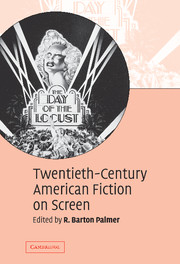Book contents
- Frontmatter
- Contents
- List of illustrations
- Notes on contributors
- Acknowledgments
- Introduction
- 1 Filming an unfinished novel: The Last Tycoon
- 2 The texts behind The Killers
- 3 The Day of the Locust: 1939 and 1975
- 4 Ship of Fools: from novel to film
- 5 Intruder in the Dust and the southern community
- 6 Dramatizing The Member of the Wedding
- 7 Film and narration: two versions of Lolita
- 8 World War II through the lens of Vietnam: adapting Slaughterhouse-Five to film
- 9 John Huston's Wise Blood
- 10 Genre and authorship in David Cronenberg's Naked Lunch
- 11 Screening Raymond Carver: Robert Altman's Short Cuts
- 12 The Color Purple: translating the African-American novel for Hollywood
- 13 The specter of history: filming memory in Beloved
- 14 Filming the spiritual landscape of James Jones's The Thin Red Line
- Filmography
- Index
- References
5 - Intruder in the Dust and the southern community
Published online by Cambridge University Press: 12 January 2010
- Frontmatter
- Contents
- List of illustrations
- Notes on contributors
- Acknowledgments
- Introduction
- 1 Filming an unfinished novel: The Last Tycoon
- 2 The texts behind The Killers
- 3 The Day of the Locust: 1939 and 1975
- 4 Ship of Fools: from novel to film
- 5 Intruder in the Dust and the southern community
- 6 Dramatizing The Member of the Wedding
- 7 Film and narration: two versions of Lolita
- 8 World War II through the lens of Vietnam: adapting Slaughterhouse-Five to film
- 9 John Huston's Wise Blood
- 10 Genre and authorship in David Cronenberg's Naked Lunch
- 11 Screening Raymond Carver: Robert Altman's Short Cuts
- 12 The Color Purple: translating the African-American novel for Hollywood
- 13 The specter of history: filming memory in Beloved
- 14 Filming the spiritual landscape of James Jones's The Thin Red Line
- Filmography
- Index
- References
Summary
When Intruder in the Dust was published in 1948, it was William Faulkner's first book to appear since Go Down, Moses in 1942. During that six-year period, Faulkner's literary reputation experienced a remarkable reversal of fortune. Although he had been held in high critical esteem throughout the1930s and had even graced the cover of Time magazine on January 23, 1939, his books began going out of print in the early to mid-1940s. In some cases the very plates on which those books were printed had been melted down for war material. Then, in 1946, the general reading public rediscovered the Mississippi novelist with the publication of Malcolm Cowley's The Portable Faulkner – a selection of fiction set in the author's mythical Yoknapatawpha County. In editing this volume, Cowley paid scant attention to the formal distinction between stories and excerpts from novels. Believing that Faulkner (1897–1962) was less the careful craftsman than the grand mythmaker, Cowley arranged the contents of his book according to narrative chronology, giving us a history of Yoknapatawpha County over a period of two centuries.
Faulkner's newly acquired fame (which included his receiving the Nobel Prize for Literature in 1950) coincided with the birth of the postwar civil rights movement in America. Two months before Intruder in the Dust was published, the Democratic National Convention in Philadelphia had split over the party's stand on race.
- Type
- Chapter
- Information
- Twentieth-Century American Fiction on Screen , pp. 82 - 94Publisher: Cambridge University PressPrint publication year: 2007



